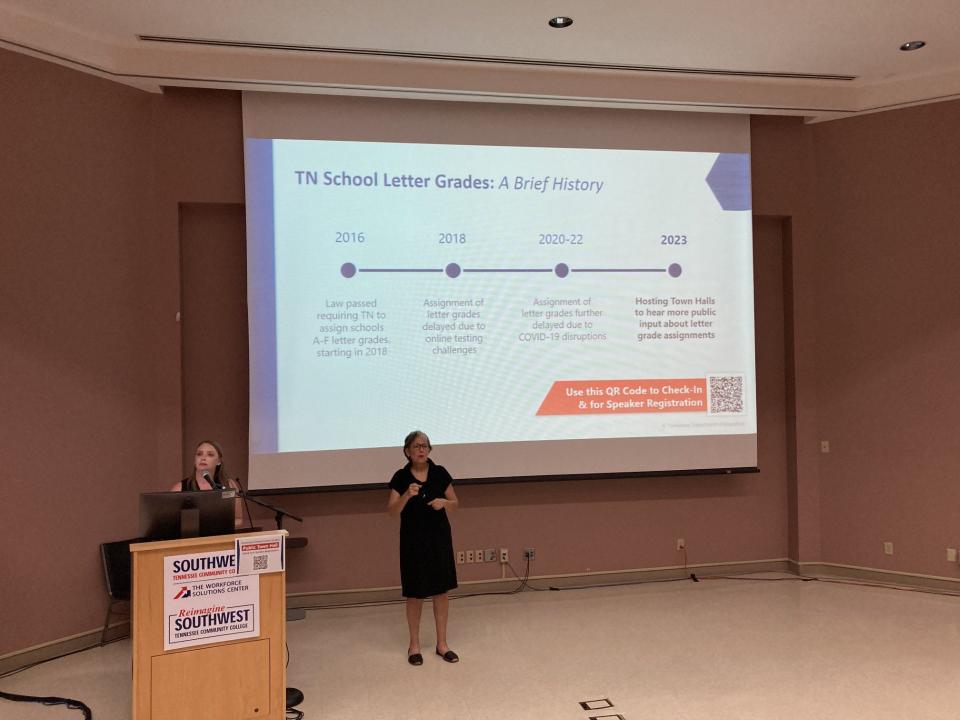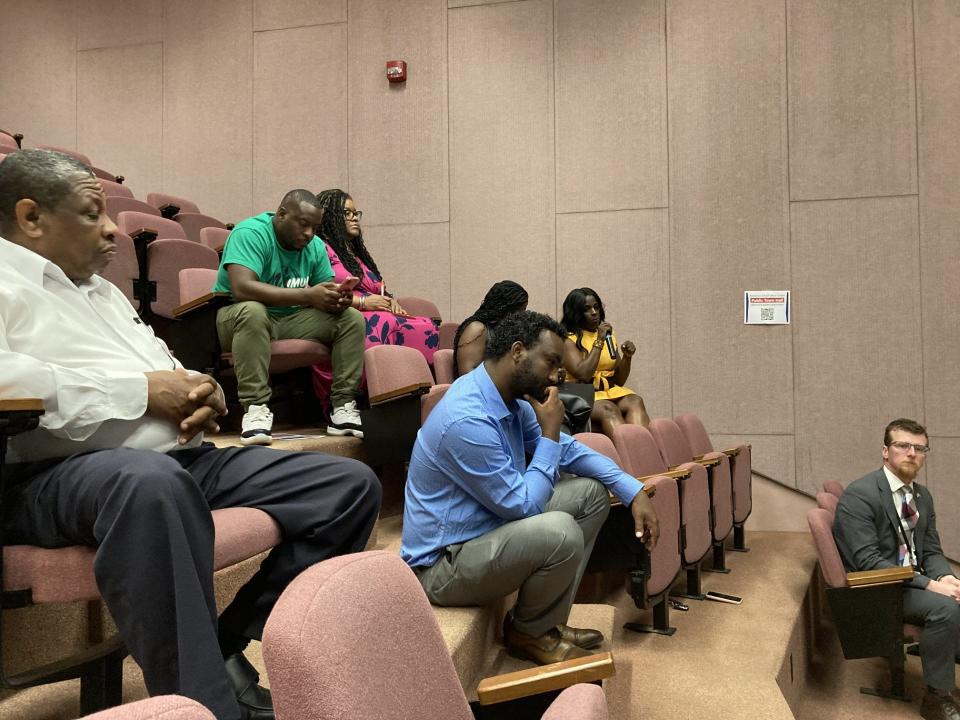How do you grade a school? TDOE, community leaders, talk new school letter grade system
Chances are you understand how students’ grades are determined. They’re assigned homework and take tests, and depending on how they fare, teachers give them an A, B, C, D, or F.
But let’s say an entire public school ― rather than just its students ― is going to receive a letter grade. How, exactly, should it be evaluated?
This is the question the Tennessee Department of Education wants answered as it prepares to hand public report cards to schools throughout the state this fall. And on Wednesday evening, department officials held a public town hall at the Macon Cove campus of Southwest Tennessee Community College to gather thoughts on the matter from community members.
“I want to make sure to invite all of you who are attending today to contribute to the discussion,” said Chelsea Crawford, TDOE chief of staff, during the meeting. “We're here to hear from you.”
Grading a school
The meeting came long after the conceptualization of school letter grades in Tennessee.

In 2016, a law was passed requiring TDOE to develop a school letter grading system. Schools would receive grades on an A to F scale for the previous academic year, which would give parents a chance to see how they were performing. They’d also be able to compare the results to the school’s past grades.
Originally, the first grades were slated to be assigned to schools in the 2017-18 academic year. But implementation was delayed first by online testing challenges, then the COVID-19 pandemic. And around seven years after the law’s initial passage, the grading system has yet to be deployed.
A new implementation date, however, has been set for November; and TDOE wants to determine how to most effectively ― and fairly ― evaluate the schools. While metrics had already been settled on after the law’s passage, the educational landscape has changed significantly in recent years.
And now, TDOE officials are traveling throughout Tennessee, gathering feedback from community members on how grades should be taken.
Differing districts
The department’s tour began in mid-August and will run through early September, and this week, officials made two stops in the Memphis area. On Tuesday evening, they held a public town hall at Bartlett High School.
Then, on Wednesday, they held the one at Southwest – where local administrators, teachers, and educational support staffers arrived to give their thoughts on the letter grades. Before they spoke, though, Crawford ran through six potential grading determinants that TDOE is already considering.

Here’s a quick breakdown:
Academics: the percentage of students meeting or exceeding grade-level expectations on state tests;
Growth: the progress ― or improvement ― students are showing on state tests, compared to the progress students are showing statewide;
Absentee rate: the percentage of students at a school who miss 10% or more days of the school year;
English Language Proficiency: the progress of students at a school who are learning English;
Graduation rate (for high schools): the percentage of students at a school who successfully finished high school in four years plus a summer;
Graduation preparedness (for high schools): the percentage of graduating students at a school who show they’re ready for college or a career.
It didn’t take long for attendants to comment on some of these potential determinants.
Brian Curry, a member of the Germantown School Board and the first attendant to speak, raised his concern over growth potentially being a heavily weighted factor. The Germantown Municipal School District’s students, he noted, already tend to perform well on standardized tests ― and continuing to improve when there’s less statistical room for growth can be challenging.
“We're at 80% for third-grade literacy… we’ve got a goal to go to 90%,” he said. “That's going to be astronomically tougher than it was going from 70% to 80%... We might go from 80% to 81%, or 80% to 82%. But we shouldn't be penalized, because it's hard, at that point, to try to get that extra percent or two.”
On the other hand, not every school district is in the same position as Germantown. Many students in Memphis-Shelby County Schools come from low-income families, and they often face a variety of challenging external factors ― like housing, transportation, and food insecurity ― that can impede learning. The district’s standardized test scores are lower than the state average, and MSCS officials and teachers are seeking to steadily improve them as they support students. Just this week, the district announced it had scored the best possible marks on TDOE's growth-focused assessment for the second year in a row.
Thus, growth is an important factor for the district. And Angela Whitelaw, MSCS’ Deputy Superintendent of Schools and Academic Support, noted this during the Wednesday meeting.
“I also want it to be fair for those schools based on the students that we serve, that our students are recognized for their growth,” she said. “Not saying that we don't want to be measured by the same criteria points. But I do think that there are always two sides to every story. So, I just want to make sure that is brought out and thought about, as we continue to look at it.”
The differences between school districts in the Memphis area and throughout the state led Curry to question whether they should all be graded with the exact same criteria.
“I don't know that you can look at every school across the state in the same category. And I’ll say this: MSCS deals with challenges that we in the suburbs can't even dream of,” he said. “They're playing a different game than we are… I almost wonder if there's some advantage to categorizing your large districts… in a category where weights might be a little different compared to the suburbs.”
It wasn’t the first time this type of point had been made to TDOE, as Crawford, the department chief of staff, noted that similar comments had been made at the Bartlett town hall the previous night.
More: Odell Horton Jr. named next MSCS general counsel, chief legal officer
“The premise of the question was, ‘Are we comparing apples to apples? Or are we comparing apples to bananas to tangerines to grapes?’” she said. “The notion about, ‘How do you how do you ensure as much of an apples-to-apples comparison in this process,’ has been brought up a number of times.”
The next level
Others in attendance said it was important to make sure that the meaning of the grades and the process behind them were clearly explained to parents, while one asked whether a school’s success in the arts ― in addition to academics ― could be considered for grading. Some noted variables that can at times be outside a school’s control, like absentee rates.
Throughout the hour-and-a-half town hall, Crawford thanked attendants for their feedback and expressed a desire for it to be taken into account as TDOE moves forward. The last town hall is set to be held on Sept. 7 in Shelbyville. After this, the department is expected to convene working groups, which will be made up of community stakeholders that look closely at the feedback and help determine how the schools are graded.
For many present, the hope seemed to be that the grades would legitimately help improve local schools – not potentially serve as a strike against them. As Whitelaw said, the grading system shouldn't be "designed to hurt," but "designed to inform parents... and to push us to that next level."
John Klyce covers education and children's issues for The Commercial Appeal. You can reach him at john.klyce@commercialappeal.com.
This article originally appeared on Memphis Commercial Appeal: TDOE, Memphis community leaders, talk new school letter grade system

